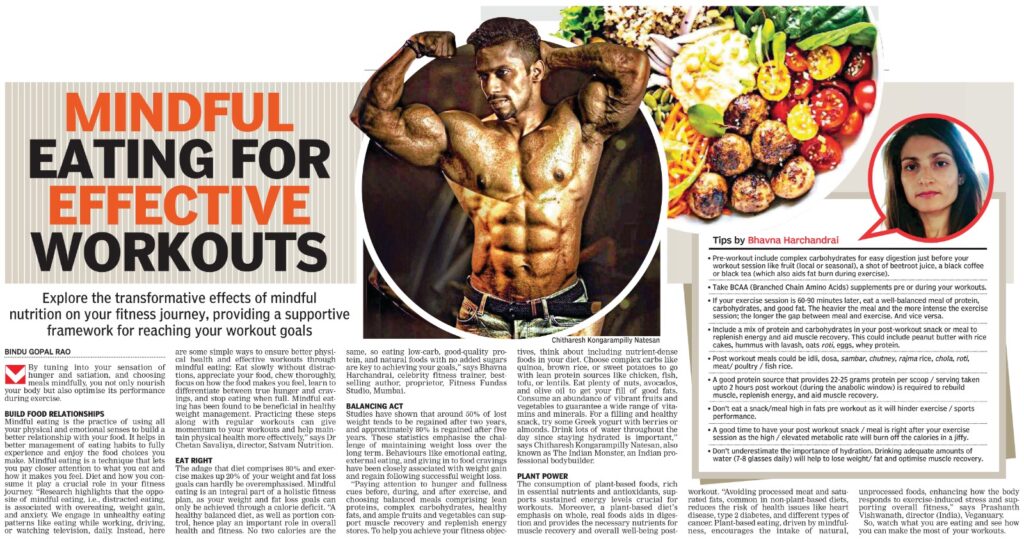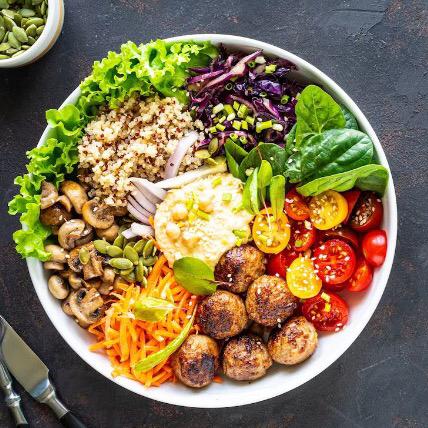Protein plays a vital role in building and maintaining muscle mass, and the misconception that animal products are necessary for meeting protein requirements is prevalent. However, a vegan diet offers ample opportunities to fulfil protein needs through various plant-based sources. Foods like lentils, beans (such as black beans, kidney beans), pulses, seeds (chia, sunflower, flax, pumpkin), soy products (soy chunks, chaap, tofu, tempeh), nutritional yeast are rich protein sources within a plant-based diet. Protein is also found in whole grains (rice, oats, quinoa, barley), and nuts (walnuts, almonds, pistachios, cashews), along with healthy fats and carbs.
When it comes to pre-workout nutrition, the focus should be on providing a combination of carbohydrates and some protein to supply readily available energy to the muscles. Vegan-friendly pre-workout snack options include a fruit smoothie with plant milks (you can choose to add a plant protein mix to it), fruits like banana, mango, or grapes, overnight oats prepared with oat or soy milk, blending frozen banana with plant milk to create banana ice cream, or consuming cooked sweet potato.
Post-workout, it’s crucial to replenish glycogen stores with a combination of carbohydrates and protein to aid muscle recovery and prevent breakdown. Vegan-friendly post-workout snacks and meal options can be- a slice of whole grain toast or crackers paired with natural peanut butter, a handful of nuts with fresh or dried fruit, a small serving of baked beans or chickpeas, and rolled oats topped with soy yogurt, chia seeds, chopped nuts, and berries.
Tips
• Focus on whole, plant-based foods including a variety of fruits, vegetables, whole grains, etc. to obtain a diverse range of nutrients.
• Be mindful of portion sizes and keep yourself adequately hydrated throughout the day, especially before, during, and after workouts.
• Focus on balanced pre-workout meals to fuel your workouts effectively.
• Post-Workout, aim to replenish energy stores and support muscle recovery.
• Make sure to use diverse plant-based protein sources like legumes, seeds, nuts, and whole grains to meet protein needs.
• While occasional fun foods are fine, limit intake of highly processed and refined foods.
• Maintain regular meal times to ensure consistent energy levels, particularly before and after workouts.
• Be mindful of added sugars and unhealthy fats present in processed foods; opt for natural sources instead.
Some simple yet effective tips for mindful eating include, planning your meals and snacks in advance for maintaining a balanced and nutritious diet. Secondly, it is important to listen to your body and pay attention to your hunger and fullness ques to prevent over or undereating. Besides, incorporate a wide range of plant-based foods to ensure a broad spectrum of nutrients and don’t forget to experiment with recipes to keep meals varied and interesting.
Do prioritise a well-balanced macronutrient intake that is customised to your unique nutritional needs and exercise goals, including proteins, carbs, and fats. Consider adding lean protein sources like turkey or plant-based options like lentils. For prolonged energy release, try healthy grains like quinoa or farro. Include healthy fats like avocados and flaxseeds in your diet to help with cognitive function and joint health. To ensure a varied spectrum of micronutrients, try a variety of colourful veggies. Do experiment with recipes to keep your meals exciting and satisfying. Importantly, do engage in mindful eating by tuning into your body’s hunger and satiety signals, fostering a positive relationship with food. On the flip side, don’t fall into restrictive diets or overly fixate on calorie counting, as this can hinder overall well-being and long-term adherence. Avoid excessive reliance on processed foods and sugary snacks, opting for whole, minimally processed alternatives whenever possible. Also, steer clear of distractions during meals, like screens, to fully engage with the eating experience.
Exploring advice from a nutritionist or registered dietitian can offer tailored insights into your dietary requirements, guaranteeing you fuel your workouts optimally. These experts can craft a nutrition plan aligned with your fitness objectives, considering individual metabolism, activity levels, and dietary preferences or restrictions. Furthermore, seeking guidance from a bodybuilding or fitness professional can provide valuable insights into meal timing, nutrient ratios, and supplementation strategies, optimizing your workout results and overall performance. Their expertise can contribute to shaping an exercise routine that harmonizes with your dietary goals, fostering a holistic approach to attaining the fitness results you desire.
Mindful eating is a rather simple process but in today’s times of multiple tasking, it seems to be highly difficult and nearly impossible. Your mind and body require time and training to shift to mindful eating patterns. Eating mindfully is a great way to understand the mind-body connection and assess both hunger and satiety effectively. It is also an effective way to avail optimal benefits of your workout journey. Here are some foods that are great to practice workout-specific mindful eating:
- Whole fruits like pomegranates, oranges, grapefruits
- Nuts and seeds like pistachios, coconuts, walnuts
- Whole grains
- Dates
- Healthy carbohydrates like starchy vegetables (potatoes, pumpkin, corn), dairy (milk and yogurt), pulses and beans (lentils, chickpeas).
- Protein-rich foods like eggs, milk, almonds, Greek yogurt, quinoa, peanut butter, black-eyed peas.
Other than these, hydration is a crucial aspect in the workout journey. Hydrate well for effective body functioning and metabolism. These are some pre- and post-workout foods for mindfully managing your physical health.
Read the full story that first appeared in Deccan Chronicle dated March 26, 2024 here:

